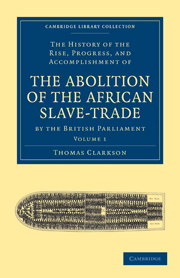Book contents
Summary
If the reader will refer to his recollection, he will find, that I have given the history of three of the classes of the forerunners and coadjutors in the great cause of the abolition of the Slave-trade up to the time proposed. He will of course expect that I should proceed with the history of the fourth. But, as I foresee that, by making certain observations upon the classes already introduced in the present rather than in any future place, I shall be able to give him clearer views on the subject, I shall postpone the history of the remaining class to the next chapter.
The account, which I shall now give, will exhibit a concurrence of extraordinary and important circumstances. It will show, first, that in each of the three classes now introduced, there were individuals in the year 1787, who had been educated as it were for the purpose of becoming peculiarly qualified to act together for the promotion of the abolition of the Slave-trade. It will show, secondly, that these, with their respective classes, acted upon their own principles, distinctly and independently of each other. And, lastly, that by means of circumstances, which they themselves had neither foreseen nor contrived, a junction between them was rendered easily practicable, and that it was beginning to take place at the period assigned.
The first class of forerunners and coadjutors consisted principally, as it has appeared, of persons in England of various descriptions.
- Type
- Chapter
- Information
- The History of the Rise, Progress, and Accomplishment of the Abolition of the African Slave-Trade by the British Parliament , pp. 193 - 202Publisher: Cambridge University PressPrint publication year: 2010First published in: 1808

